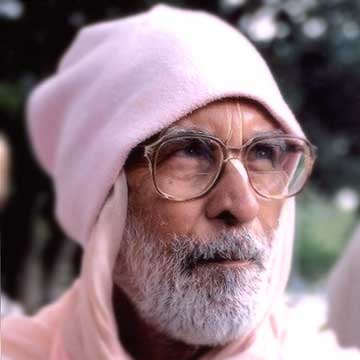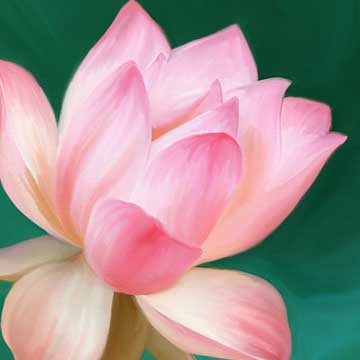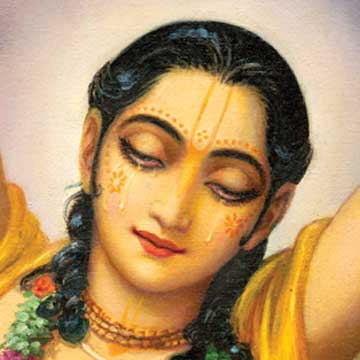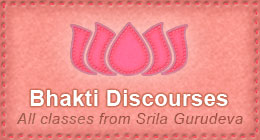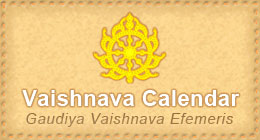What The Pure Devotee Thinks While Chanting
- Details
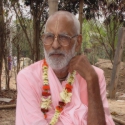
The sadhaka is thinking about the sweet pastimes explained in the Srimad Bhagavatam, which he has heard from his gurudeva. It seems that he is here, but he's not here. He is in Vrndavana, chanting Hare Krsna Hare Krsna Krsna Krsna Hare Hare / Hare Rama Hare Rama Rama Rama Hare Hare with tears in his eyes and hairs standing on end. He is totally absorbed...
A Is For Apple, B Is For Ball
- Details
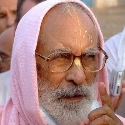
We have been discussing about the bhakti creeper. First of all we should know what is real bhakti. Pure bhakti is called uttama-bhakti. We must know this. Nowadays, some persons here, also in India but especially in Western countries, want to jump at once without any sadhana and without any bhajana. They don't practice the limbs of bhakti as explained in Bhakti Rasamrita Sindu. At once they want to jump - to see naked Radha-Krsna in Their nisanta-lila...
Annakuta Mahotsava
- Details
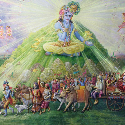
There were three mantras especially uttered by Srila Prabhupada Bhaktisiddhanta Sarasvati Thakura when he offered puspanjali at the lotus feet of Giriraja Govardhana. Although they are taken from songs, they are now accepted as the mantras used in the worship of Govardhana. The first is from Stava-mala by Srila Rupa Gosvami...
Bhandiravana Pastimes
- Details
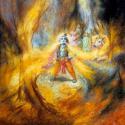
Krsna used to come with lakhs of cowherd boys to this place. They used to eat butter, fruits, pickles, and other types of food sent by their mothers. While having the cows graze, Krsna used to sit in the middle while the sakhas would surround Him in concentric circles.
In Celebration of Akṣaya-tṛtīya
- Details
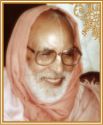
by Śrī Śrīmad Bhaktivedānta Nārāyaṇa Gosvāmī Māhārāja
It is on this very day that Bhagavān reinitiates Satya-yuga after destroying the atheists [the so called] Buddhists in His incarnation as Kalki. ...
Aksaya-tritiya
- Details
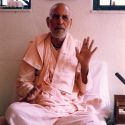
Today is a very auspicious day – Aksaya-trtiya. We will observe it tomorrow, however, because today there are three tithis touching one day. Today the door of Bhadri-narayana will be open, and therefore a festival will be observed in Puri with Lord Jagannatha. Candana-yatra will also begin on this auspicious day...
What to Think About While Chanting
- Details
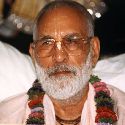
Syama-kunda and Radha-kunda are extremely beautiful, surrounded by the many exquisite sweet groves of Lalita, Visakha, and all the other principle sakhis. We want the mercy of Radha and Krsna Conjugal. Srimati Radhika is our Svamini, our worshipful mistress, so we must please Her. How do we please Her? Not by glorifying Her...
True Sannyasa verses Sahajiya Babajis
- Details
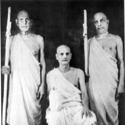
A personality who can preach the mission of Caitanya Mahaprabhu throughout the world in very short time, who can translate and write commentaries to authentic books like Sri Caitanya-caritamrta, who can publish and explain Srimad-Bhagavatam and the books of Srila Rupa Gosvami and Srila Jiva Gosvami – how can he be an ordinary person? He was certainly in the line of Srila Bhaktivinoda Thakura, Srila Raghunatha dasa Gosvami, Srila Rupa Gosvami, Svarupa Damodara, Raya Ramananda, and Sri Caitanya Mahaprabhu...
Sadhu-sanga a must
- Details
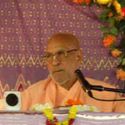
This time is very critical for all devotees, as shown by the example of ISKCON after the departure of Srila Bhaktivedanta Swami Maharaja. All the devotees became weak because they had not developed real taste for bhakti. They had given up their jobs, wealth and everything else, but they did not develop a taste for bhakti, nor did they even have nistha, the determination of mind to do bhajana. To develop these qualities, a high class of association (sadhu-sanga) is needed...
Where Is Your Wealth?
- Details
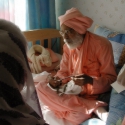
We have been discussing about the bhakti creeper. First of all we should know what is real bhakti. Pure bhakti is called uttama-bhakti. We must know this. Nowadays, some persons here, also in India but especially in Western countries, want to jump at once without any sadhana and without any bhajana. They don't practice the limbs of bhakti as explained in Bhakti Rasamrita Sindu. At once they want to jump - to see naked Radha-Krsna in Their nisanta-lila...
The Appearance Day of Gadadhara Pandit
- Details
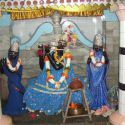
Who is Gadadhara Pandita? He is Srimati Radha Thakurani. Why did he come? To help Mahaprabhu enjoy Radhika’s three moods. From time to time he used to help Mahaprabhu experience these moods. When Nityananda Prabhu went to the house of Nandana Acarya in Navadvipa, Gadadhara went with Mahaprabhu, Srivasa Pandit, Mukunda, and so many others....
Sri Gadadhara Pandita And Tota-Gopinatha
- Details

When Sri Caitanya Mahaprabhu lived in the cave at Gambhira, He was always thinking of Krsna and weeping. He came to this world to taste radha-bhava, and His activities while in Gambira comprise a drop of the ocean He experienced. While living in Gambira He gave the deity of Gopinatha to Srila Gadadhara Pandita and told him, "Today I will give you a very good thing. Will you accept it?"
The Glories of Sri Gadadhara Pandita
- Details

Srimati Radhika came in the form of Sri Gadadhara. You should try to know Gadadhara-tattva. There is no difference between Sri Gadadhara Pandita and Srimati Radhika, but the activities are different in Krsna's pastimes and Gaura's pastimes. In Gaura-lila Sri Gadadhara Pandita is in the mood of a servant....
A Glimpse Into Sri Ujjvala-Nilamani
- Details
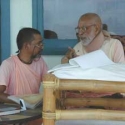
On this island I am totally absorbed in writing about the very elevated moods of Srila Rupa Gosvami; moods that were inspired in him by Sri Caitanya Mahaprabhu Himself. Mahaprabhu ordered Srila Rupa Gosvami to write about the deep moods of the gopis, as well as the process by which we can achieve similar moods. Most of you are not qualified to hear or read about this, what to speak of follow, and yet we are writing. Otherwise, if we do not do so...
The Goal And How To Get There
- Details

Why did Krsna appeared in this world. What was the main reason? Why did Krsna appear in the form of Sri Caitanya Mahaprabhu? Hear this very patiently...
How Will You Get There?
- Details
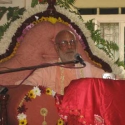
If you do not know the real goal of your life - where you must ultimately go - then where will you go? Therefore, we should know the aim and object of our life, and the process by which we can attain it. We can understand all these truths from the literature of Srila Rupa Gosvami, and especially from Srila Visvanatha Cakravarti Thakura...
Page 16 of 48

